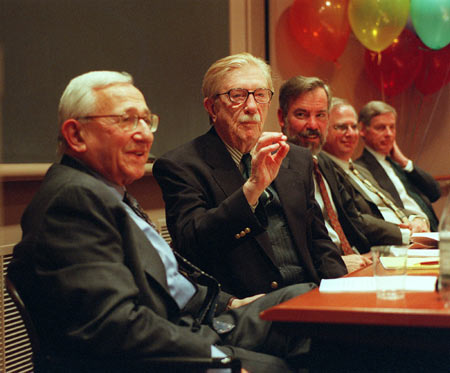CES professor honored on 90th birthday

Four distinguished scholars gathered at the Center for European Studies Oct. 29 to pay 90th-birthday respects to their former professor, Samuel Beer, the Eaton Professor of the Science of Government Emeritus.
“We wondered what to give you,” said moderator Peter Hall, the Frank G. Thomson Professor of Government. “We finally decided the best present would be some vigorous criticism of your work.”
The work in question was an introductory chapter Beer had written to accompany a new collection of his essays. Vigorous criticism it may have been, but it was also laced with generous amounts of affection and respect.
Melvin Richter, a professor of political science at Hunter College of the City University of New York, remembered serving as a teaching assistant in Beer’s famous course “Soc. Sci. 2.” In his lectures, Beer presented the class with opposing viewpoints from a series of crucial political conflicts.
“Sam’s lectures were remarkable for their objectivity,” Richter said. “Often students were completely convinced by the first set of views, only to find the second set equally persuasive.”
Joel Krieger, a political science professor at Wellesley College, praised Beer’s 1965 study, “Modern British Politics,” calling it “the most influential criticism of British politics ever written.” Krieger said, “Once I encountered Sam’s paradigm, I was never the same. Whenever I considered British politics I would hear Sam’s voice and thought about the questions he would have asked.”
During the discussion period, Beer elaborated on the ideas he had written about in the chapter, affirming his admiration for modern Western liberalism and its commitment to freedom of inquiry.
“No other civilization has allowed people to think freely about religion. Every other great civilization has been hierarchical, corporatist, and closed.”
Beer, who is still an active scholar, gave evidence of his undiminished powers of memory on more than one occasion. During one exchange, Hall remarked on the difficulty of studying discussion in government.
“Who was that woman who came up with a method for studying discussion, the one we heard speak a few years ago?” Beer asked.
Hall laughed. “You can’t expect me to remember something like that. After all, I’m in my 50s!”
A moment later, Beer retrieved the name.
Beer enthralled and amused his audience with reminiscences of his days as a Rhodes Scholar at Oxford in the 1930s, at one point breaking into an imitation of author H.G. Wells speaking to a group of left-wing students. Challenged to mention anything good about England at the time, Wells had replied, “I’ll name two things – hospitals and lighthouses.”
Later, Beer summarized his intellectual odyssey in a few brief, thought-provoking words: “In my case, it’s been a journey from the land of reason to the land of imagination. I believe that thought advances through metaphor rather than through precept. I really believe that metaphors – those corny expressions, almost a kind of street poetry – tell you more about the future than the think tanks do.”




